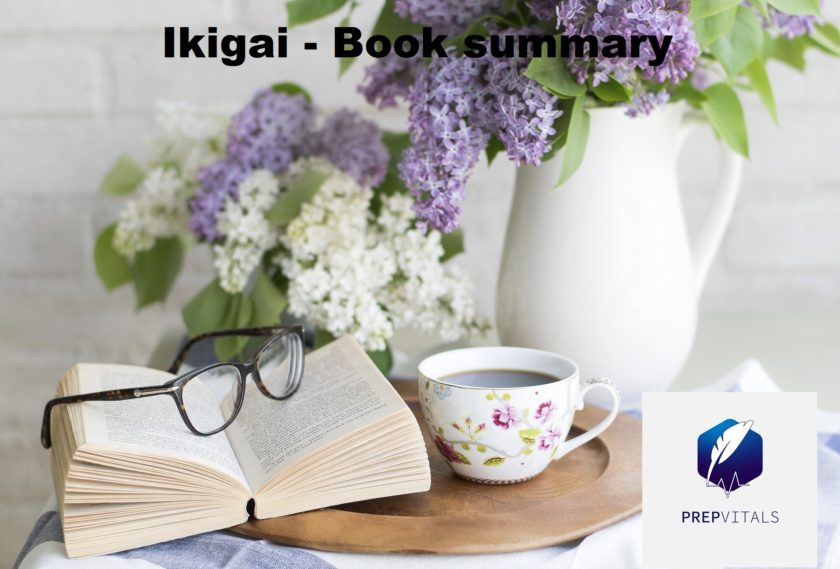
In this summary, I would like to share with everyone the valuable lessons that I learned from the inspiring book, ‘IKIGAI -The Japanese Secret to a Long Happy Life’. The book is authored by Hector Garcia and Francesc Miralles.
This book shares insights from the Japanese philosophy known as Ikigai.
What is Ikigai?
Ikigai is a combination of two words which means the reason of being.
“We ask ourselves things like: What is the meaning of my life? Is the point just to live longer, or should I seek a higher purpose? Why do some people know what they want and have a passion for life, while others languish in confusion? At some point in our conversation, the mysterious word ikigai came up”.

According to people in Okinawa, it is the reason to get out of bed every morning. Okinawa is an island in Japan that holds first place among the world’s Blue Zones– the geographical regions where people live longest. These people are said to be well aware of their Ikigai. This plus some other factors seem to play an important role in their longevity and happiness.
Active Mind; Youthful Body
We all have heard the classic saying “a sound mind in a sound body” Mental fitness holds the same importance as physical fitness. Exposing yourself to change, stepping out of your comfort zone, learning new things every day, interacting with other people, and dealing with new situations are all included in mental training that not only has a positive effect on a person’s mood but also slows the aging process of neurons in the brain.
Stress: Accused of killing longevity and can be avoided by practicing mindfulness
No doubt stress in moderation is beneficial—it helps us overcome challenges in our daily lives. Nonetheless, the stress to which human beings are subjected today is clearly harmful. Nowadays people live in a nearly constant state of competition. Stress has a degenerative effect over time.
This is why many experts recommend practicing mindfulness. The central premise of this stress-reduction method is focusing on the self: noticing our responses, even if they are conditioned by habit, in order to be fully conscious of them. In this way, we connect with the here and now and limit thoughts that tend to spiral out of control.
“We have to learn to turn off the autopilot that’s steering us in an endless loop. We all know people who snack while talking on the phone or watching the news. You ask them if the omelet they just ate had onion in it, and they can’t tell you,” says Roberto Alcibar, who abandoned his fast-paced life to become a certified instructor of mindfulness after an illness threw him into a period of acute stress.
Finding flow in everything you do
According to the book Flow: The Psychology of Optimal Experience, flow is “the state in which people are so involved in an activity that nothing else seems to matter; the experience itself is so enjoyable that people will do it even at great cost, for the sheer sake of doing it.”
When we flow, we are focused on a concrete task without any distractions. Our mind is “in order.” The opposite occurs when we try to do something while our mind is on other things. There are several strategies you can employ to increase the chances of achieving flow.
1. Choose a difficult task (but not too difficult!)
2. Have a clear, concrete objective
3. Concentrate on a single task
The Ikigai Diet: What the world’s longest-living people eat and drink
What secrets to long life do the Japanese hold? What is it about Okinawa that makes it the best of the best in terms of life expectancy?
- They eat a wide variety of foods including fruits, vegetables, and grains, and a diet rich in antioxidants.
- They follow ancient Japanese rule Hara Hachi bu also known as 80 percent rule. It’s easy to do: When you notice you’re almost full but could have a little more … just stop eating!
The key to staying healthy while consuming fewer calories is eating foods with a high nutritional value (especially “super foods”) and avoiding those that add to our overall caloric intake but offer little to no nutritional value.
Resilience and Wabi-Sabi
Resilience is the capacity to recover quickly from difficulties. But it is not just the ability to persevere but also staying focused on one’s objectives, without giving in to discouragement. Mental resilience can be exercised by knowing what we can change and what we cannot to avoid being carried away by negative emotions.
Wabi-sabi is a Japanese concept that shows us the beauty of the imperfect nature of the world around us.
This is why the Japanese place such value, for example, on an irregular or cracked teacup. Only things that are imperfect, incomplete, and ephemeral can
truly be beautiful, because only those things resemble the natural world.
The book concludes with 10 rules of ikigai taken from the wisdom of long living residents of Ogimi.

Written By: Madeeha Manzoor


